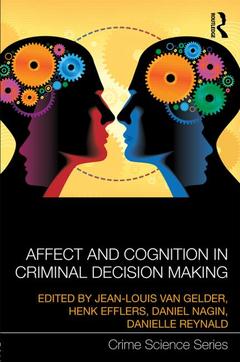Affect and Cognition in Criminal Decision Making Crime Science Series
Coordonnateurs : van Gelder Jean-Louis, Elffers Henk, Reynald Danielle, Nagin Daniel

Research and theorizing on criminal decision making has not kept pace with recent developments in other fields of human decision making. Whereas criminal decision making theory is still largely dominated by cognitive approaches such as rational choice-based models, psychologists, behavioral economists and neuroscientists have found affect (i.e., emotions, moods) and visceral factors such as sexual arousal and drug craving, to play a fundamental role in human decision processes.
This book examines alternative approaches to incorporating affect into criminal decision making and testing its influence on such decisions. In so doing it generalizes extant cognitive theories of criminal decision making by incorporating affect into the decision process. In two conceptual and ten empirical chapters it is carefully argued how affect influences criminal decisions alongside rational and cognitive considerations. The empirical studies use a wide variety of methods ranging from interviews and observations to experimental approaches and questionnaires, and treat crimes as diverse as street robbery, pilfering, and sex offences. It will be of interest to criminologists, social psychologists, judgment and decision making researchers, behavioral economists and sociologists alike.
1. Introduction Affect and Cognition in Criminal Decision Making: Between Rational Choices and Lapses of Self-Control, 2. Affect and the Reasoning Criminal: Past and Future, 3. Affect and the Dynamic Foreground of Predatory Street Crime: Desperation, Anger, and Fear, 4. Posterior Gains and Immediate Pains: Offender Emotions Before, During and After Robberies, 5. The Role of Sexual Arousal and Perceived Consequences in Men’s and Women’s Decisions to Engage in Sexually Coercive Behaviors, 6. Sexual Arousal and the Ability to Access Sexually Aggressive Consequences from Memory, 7. Emotional Arousal and Child Sex Offending: A Situational Perspective, 8. "I Would Have Been Sorry": Anticipated Regret and the Role of Expected Emotions in the Decision to Offend, 9. Anticipated Emotions and Immediate Affect in Criminal Decision Making: From Shame to Anger, 10. Emotional Justifications for Unethical Behavior, 11. A Neuropsychological Test of Criminal Decision Making: Regional Prefrontal Influences in a Dual Process Model, 12. Traits and States of Self-Conscious Emotions in Criminal Decision Making.
Jean-Louis van Gelder currently works as a researcher at the Netherlands Institute for the Study of Crime and Law Enforcement (NSCR). His research interests focus on criminal decision making where he applies insights from social psychology and social cognition to study the interplay of affect and cognition on criminal decisions. Recently, he started researching multiple self models and future self continuity, to apply them to criminal behavior. Other research interests include personality and crime and informality in developing countries.
Henk Elffers is a senior-researcher at NSCR and professor of empirical research into criminal law enforcement at VU University Amsterdam. He has worked in the field of rule compliance, spataila criminology, rational choice, guardianship, punishment.
Daniel Nagin holds a PhD in Urban and Public Affairs from Carnegie Mellon University, where he is now the Teresa and H. John Heinz III University Professor of Public Policy and Statistics, and a specialist on deterrence theory. He has amply published on various aspects of the rational choice paradigm in criminology.
Danielle Reynald trained as a social-psychologist (London) and did a Ph.D in criminology (Amsterdam). She is a lecturer in Criminology at Griffith University, where she teaches spatial and environmental criminology. Her specialism is guardianship research.
Date de parution : 11-2013
15.6x23.4 cm
Disponible chez l'éditeur (délai d'approvisionnement : 14 jours).
Prix indicatif 172,36 €
Ajouter au panierDate de parution : 07-2015
15.6x23.4 cm
Thème d’Affect and Cognition in Criminal Decision Making :
Mots-clés :
The Reasoning Criminal; Criminal Behaviour; Delinquent Behaviour; Judgment and Decision Making; Behavioral Economics; IGT Performance; Criminal Decision; Agnew’s General Strain Theory; Visceral Factors; Selfconscious Emotions; Anger Condition; Visceral States; Sexual Arousal; Self-conscious Emotions; Count Span; General Strain Theory; Situational Crime Prevention Perspective; Criminal Choice; Anger Manipulation; Arousal Group; Crime Involvement; Neurocognitive Measures; Child Sex Offending; Cost Perceptions; Sexual Excitation; Non-sexual Affect; Sexual Coercion; Consistent Inhibitory Effect; Negative Relationships; Spacebar Presses
